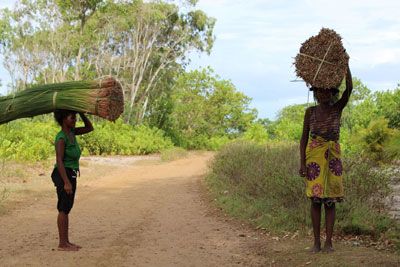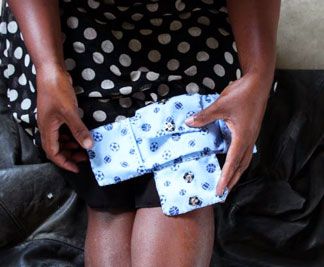A period of progress
In recent months, global initiatives to address period poverty have made the headlines with Scotland becoming the first nation in the world to make period products freely available. In February, New Zealand followed suit, making menstrual hygiene products free for students over the next three years. But whilst these countries take steps towards ending period poverty, how is it being tackled in Madagascar, a country with far poorer sanitation, hygiene facilities, and public funds? Since January, SEED has been working with the Mahampy Weavers’ Cooperative on a new Menstrual Hygiene Management (MHM) project, aiming to empower and support the women with their menstruation by providing access to sanitary materials and menstrual health education.
Period poverty is a global issue that affects millions of women and girls worldwide. As a term, ‘period poverty’ refers to ‘a lack of access to sanitary products and having a poor knowledge of menstruation often due to financial constraints’1. Unfortunately, this is the reality for many women living in Southern Madagascar who, aside from the economic hardship caused by the pandemic, are faced with another barrier in supporting themselves and their families each month – insufficient menstrual hygiene management (MHM).
 Since 2019, one of SEED’s sustainable livelihood’s projects, Project Mahampy, has been working to increase the income of female mahampy weavers, increasing their agency through the creation of a Weavers' Cooperative, improving routes to market, and creating a workspace for women to store and resell their woven goods. However, with several project activities delayed due to the ongoing pandemic, the Mahampy team have begun a new initiative. With little access to MHM within the community, the new scheme is teaching the weavers how to make reusable sanitary pads whilst providing them with menstrual health education. SEED hopes that by supporting the women to manage their menstruation, this will increase their bodily autonomy and minimise the disruption of their period on their daily life and wellbeing.
Since 2019, one of SEED’s sustainable livelihood’s projects, Project Mahampy, has been working to increase the income of female mahampy weavers, increasing their agency through the creation of a Weavers' Cooperative, improving routes to market, and creating a workspace for women to store and resell their woven goods. However, with several project activities delayed due to the ongoing pandemic, the Mahampy team have begun a new initiative. With little access to MHM within the community, the new scheme is teaching the weavers how to make reusable sanitary pads whilst providing them with menstrual health education. SEED hopes that by supporting the women to manage their menstruation, this will increase their bodily autonomy and minimise the disruption of their period on their daily life and wellbeing.

The MHM project got off to a great start. With the baseline assessment complete and sewing training already underway, the project is fast approaching the halfway mark! With a total of 122 women out of the 166 members of the Cooperative participating in the programme, the pilot has garnered strong support from the weavers. In January, the rapid assessment survey was completed with 22 members interviewed across all five sub-Cooperatives, allowing SEED to establish the current barriers faced by the women when dealing with their period. Conversations showed that, in Sainte Luce, menstruation was causing disruption to the women weavers and their daughters largely due to a lack of MHM awareness. For young women in particular, the lack of MHM facilities at nearby schools has a negative impact on their attendance and learning. The surveys also revealed that the women currently use vorotsembo, folded old fabric, to manage their period, and are unable to buy new material or disposable products due to the cost.
When asked about their interest in making a reusable sanitary pad, all the women surveyed were eager to learn and were keen to use it as a more comfortable and functional alternative. Some of the women were also willing to learn in order to pass their skills onto their daughters, so they could better support them with their period at school. After working on a similar project with women during the Ambinanikely fire appeal, Myrah, the project Sewing Trainer, redesigned a new and improved pad prototype based on feedback from women in Fort Dauphin and Sainte Luce. The key new feature of the pad is the liner, which can be taken out and changed throughout the day and is therefore much quicker to dry after washing. In this short video, Myrah also explains how the modifications and a new discreet design have had a positive effect in encouraging the women to start using the reusable pads. With the planning stages complete, the sewing could begin!
Starting in February, the sewing training initially began with two train-the-trainer sessions that were delivered to ten women, two from each of the five Weavers’ sub-Cooperatives. The ten women were trained as sewing trainers themselves and are now ready to pass their knowledge onto the remaining members of their sub-Cooperatives. Although the women had little to no sewing experience before the sessions, all the women made great progress and learnt to sew the reusable pad whilst being taught how to wash, care for, and use it.
After discussing the challenges the women faced during their menstruation in the rapid assessment, MHM information sessions were also introduced to support the women with their concerns. Beginning next week, the women will learn how to track their cycle to minimise the disruption caused by the uncertainty of their period , and learn the common symptoms of menstruation, of which many of the women said they experienced. Although the women all said they were comfortable discussing menstruation with one another, the sessions have been conducted informally to create an open and comfortable environment given the taboo of menstruation that is present in Malagasy culture.

Over the next few months the women will continue to attend training sessions led by the sewing trainers. With 122 women aiming to make three pads each by the end of May, there’s a lot of sewing still to be done to reach the target of 366! Keep an eye on our social media channels over the next few months to see how this scheme is making a difference to the lives of women and girls in the Mahampy Weavers’ Cooperative! Happy International Women’s Day everyone!
References
- “What is period poverty”, Bodyform, accessed March 5th 2021, https://www.bodyform.co.uk/our-world/period-poverty/.
